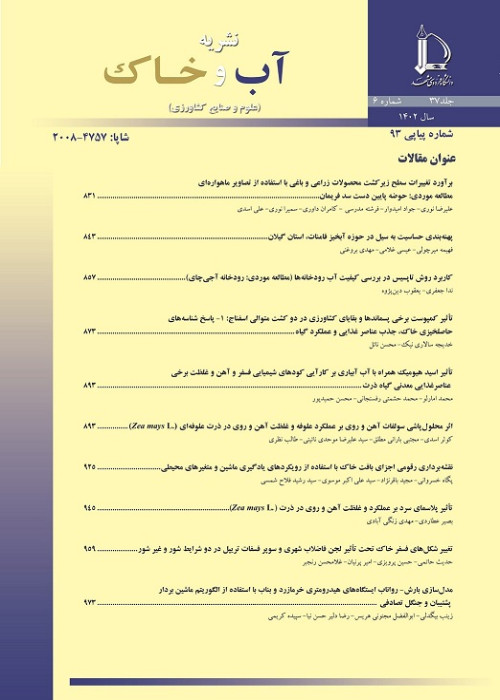The Effect of Bacillus Bacteria on Phosphorus Release from Oil Refinery Plant-solid Waste in a Calcareous Soil
Due to the increasing development of edible oil processing industries, large amounts of wastewater and solid wastes (SW) are inevitable in these industries. Organic wastes can be used as soil conditioners in agriculture due to the high content of organic matter and nutrient loads. Phosphorus solubilizing bacteria including Bacillus spp., Pseudomonads and Rhizobium spp. can release phosphorus from insoluble organic and mineral sources in soil. Most soils in the semi-arid regions, including southern parts of Guilan province, have low organic matter content and do not support plant cultivation due to the low fertility and instability of soils. Hence, industrial wastes can be applied as a suitable and low-cost source of organic materials and nutrients in these soils. As phosphorus is one of the most important essential nutrients in plant nutrition which is also present in oil refinery soild wastes and P solubilizing bacteria can release phosphorus from the organic phase of the wastes and make it available in the soil solution, this study aimed to investigate the available phosphorus (Pava) content of soil after simultaneous addition of olive refinery-solid wastes and P solubilizing Bacillus spp.
the solid waste obtained from Ganje Rudbar oil refinery plant (located in Rudbar, Guilan province) and a soil sample was collected from a surface layer (0-30 cm) of a pasture, located in Lowshan area (Guilan province). A native strain of Bacillus sp. was isolated from the sampled soil based on its P-solubilizing ability in Sperber medium. An indicator strain, Bacillus persicus was also included in the experiments. P-solubilizing ability of the indicator strain was also evaluated in Sperber medium. The experiment was conducted in a completely randomized design based on factorial arrangement and three replications. Factors included three levels of solid waste (0, 2 and 4%), three levels of inoculated bacteria (no bacteria, native Bacillus sp. and Bacillus persicus) and eleven sampling times (0, 2, 7, 14, 28, 42, 56, 86, 116, 146, and 176 days). Different levels of solid waste were added to the soil, inoculated with bacteria (106 cell/g), and incubated at laboratory condition (~25 ºC) for six months. The moisture content of the soil mixtures fixed around 0.7 FC and kept constant during the incubation period. Sampling was done at desired times. The pH, organic carbon (OC), soil Basal Respiration (BR), available phosphorus concentration (Pava), and phosphatase enzyme activity were measured in soil samples. Data analysis and means comparison were done by Duncans’ test using SAS software package.
The studied soil was loam in texture, and had slightly alkaline pH, moderate Pava, and low OC content. The studied solid waste contained considerable OC and total P load. The effect of solid waste (SW), bacteria, sampling time and their interactions were significant on most of the measured characteristics (p < 0.05). SW application decreased soil pH and mixtures inoculated with native Bacillus sp. had lower pH values compared to those inoculated with Bacillus persicus, probably due to the greater effect of Bacillus spp. on SW decomposition compared with B. persicus. The highest average BR was attained in mixtures contained 4% SW which was 1.24 and 1.73 times greater than that in mixtures contained 2 and 0% SW, respectively. While the effect of SW on soil BR was obvious, bacteria inoculation had different impact on soil organic material decomposition and the lowest BR was measured in soil (0% SW) inoculated with Bacillus persicus. OC content of mixtures increased with SW application. The highest OC level (3.21 g 100g-1) was obtained in uninoculated mixture contained 4% SW, which was significantly greater than OC levels in mixtures inoculated with bacteria (p < 0.05). The lowest OC level (3.21 g 100g-1) was observed in uninoculated soil (0% SW). SW application significantly increased Pava. The greatest Pava concentration (142.77 mg Kg-1) was attained in uninoculated mixture contained 4% SW which was not significantly different from Pava concentration in 4% SW-mixture inoculated with native Bacillus sp. (P > 0.05). In control treatments (0% SW), Bacillus persicus was efficient in P release from soil native organic carbon and/or phosphate minerals. However, among the soils contained 2% SW, those inoculated with native Bacillus sp. had the highest Pava concentration. The average Pava concentration in the 4% SW-mixtures was 136.33 mg Kg-1 which was 3.5 times greater than that in control treatment (0% SW). Although soil Pava was related to phosphatase enzyme, this enzyme activity was not affected by treatments. In the P-releasing trend, it was found that 4% SW-mixtures had the highest Pava concentration after 6 months of incubation, and bacteria inoculation made the P-release trend to be flatter compared to control.
The application of oil refinery plant-solid waste improved the basal respiration of the studied soil and increased available phosphorus concentration. The comparison of applied solid waste levels showed that the inoculation of soil with Bacillus bacteria had a positive effect on available phosphorus concentration only at 2% solid waste level.
- حق عضویت دریافتی صرف حمایت از نشریات عضو و نگهداری، تکمیل و توسعه مگیران میشود.
- پرداخت حق اشتراک و دانلود مقالات اجازه بازنشر آن در سایر رسانههای چاپی و دیجیتال را به کاربر نمیدهد.



